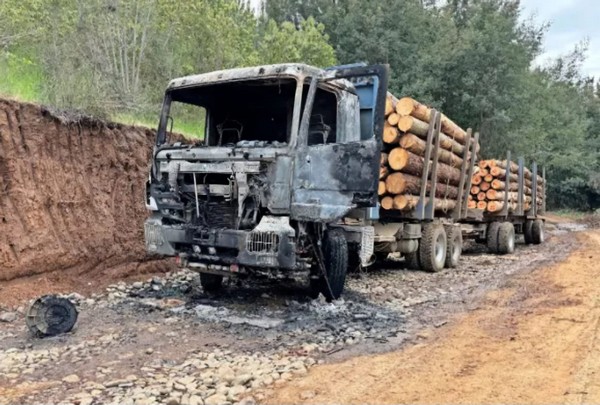One must go back to 2017, a season in which 14 arson attacks against forestry activities in the southern macrozone were reported, to find a year with fewer than 40 episodes of attacks on operations—including a peak of 104 cases between January and December 2022. With the current season about to conclude, the year would end with 26 attacks. Additionally, all indicators measured by forestry contractors show less drastic results, an effect the industry attributes to the state of emergency in place since May 2022.
Thus, when comparing 2023 and 2024, the affected municipalities dropped from 26 to 15; burned trucks decreased from 60 to 29; destroyed or stolen pickup trucks went from 15 to 10; disabled forestry cranes fell from 15 to five; excavators turned into scrap metal dropped from 10 to two; and economic losses went from $16.4 billion to $13.3 billion.
Risk Zones with No Production
However, according to the Association of Forestry Contractors, there are 115,000 hectares of forests ready for exploitation where no production work is carried out due to the risk of entering areas where criminal groups continue to operate, maintain territorial control, and engage in extortion. For example, the association points out that companies have stopped working in Tirúa, Cañete, and Contulmo, in the southern cone of Arauco, and have also reduced their presence in sectors of Malleco, Cautín, and Osorno. Therefore, they urge authorities to reinforce patrols and criminal prosecution in the municipalities of Carahue (5 attacks), Collipulli (4), Nueva Imperial (3), Lautaro (2), and Río Negro (2), which account for over 50% of this year's attacks.
"This situation affects many areas. Just from the perspective of labor hiring, more than 1,500 direct jobs are lost," explains René Muñoz, manager of the forestry contractors. He adds that "it must be considered that rural areas are economically depressed, and the main source of employment is forestry activity." He warns that "having 115,000 hectares without production goes against what Chile needs," as "this sector requires expansion; otherwise, capital will continue to flow to other countries."
Source:El Mercurio







Comentarios (0)
No hay comentarios aún. ¡Sé el primero en comentar!
Deja un comentario